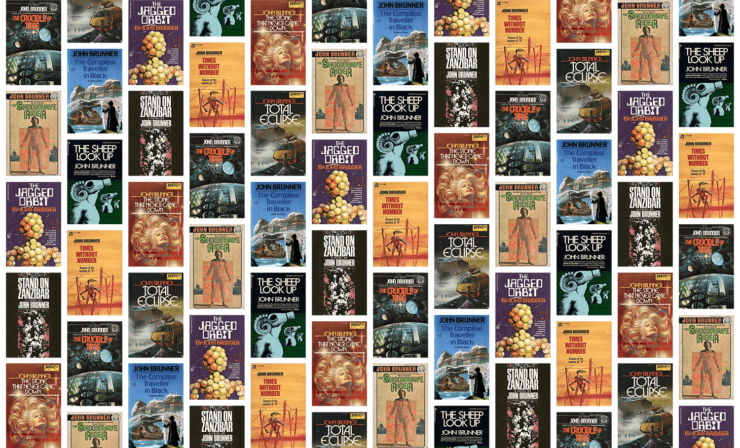John Brunner was born eighty-eight years ago, on September 24, 1934. He died just short of his sixty-first birthday, on 25 August 1995, while attending Intersection Worldcon in Glasgow. Between the years 1951 and 1995, Brunner wrote dozens of science fiction, fantasy, horror, and mystery works, many of them award-winning.
While I expect that many of my readers will have read and liked Brunner novels, I would not be surprised if other readers, perhaps a majority, have not had firsthand experience with his work. Therefore, with the melancholy anniversary of Brunner’s death just past and with his birthday coming up, this seems a suitable time to suggest some Brunner works to the tsundoku of those unfamiliar with this author. Here are ten; the last four are award-winning works generally agreed to be among his best.
John Brunner by Jad Smith (2012)
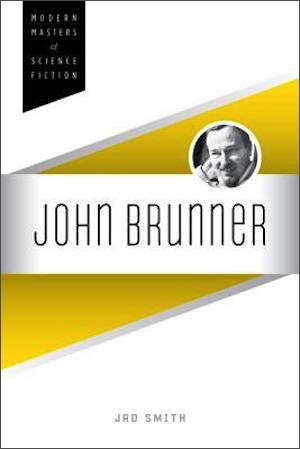
First up, a monograph not by Brunner but about Brunner. Although just 184 pages long, of which just 127 pages are the monograph proper, this is a compact, fascinating examination of Brunner’s life, career, his ambitions, and the constraints under which he struggled. The only thing I might critique is the brevity. Who knows? Perhaps if a few thousand of you purchase the monograph, Smith will compose a longer work.
The Stone That Never Came Down (1973)
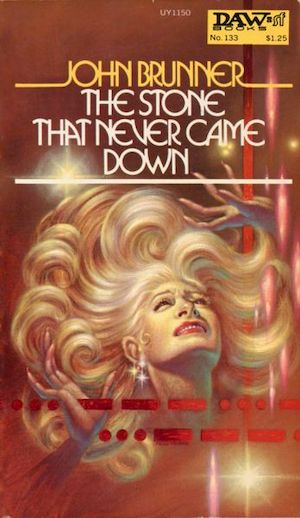
Some might claim that Brunner was incapable of writing an upbeat novel, that some hook was always hidden even in the most cheerful of endings. This book is proof to the contrary: In a world torn by familiar conflicts, a novel substance, VC, offers the world a gift its leaders do not at all appreciate. VC makes humans discerning and critical. Doublethink and self-delusion lead to distressing cognitive dissonance; negative feedback shuts them down. VC could eliminate human folly and save the human race from itself… if the people whose rule depends on folly do not discover its existence in time to suppress it.
Total Eclipse (1974)
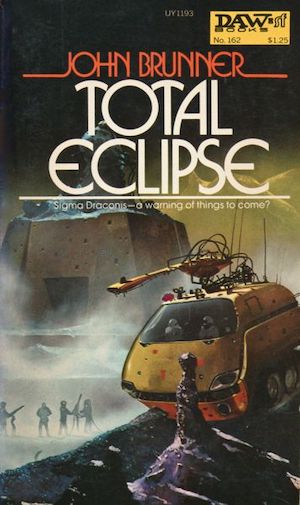
Total Eclipse, on the other hand, is exactly the sort of Brunner novel that made The Stone That Never Came Down so surprising. The Draconians of Sigma Draconis III left behind a wealth of artifacts but no descendants. All Draconians perished after a mere three millennia of advanced civilization. The thirty human researchers stationed on Sigma Draconis III hope to learn why such a promising culture vanished so completely. The answer will bring no comfort.
The Compleat Traveller in Black (1982)
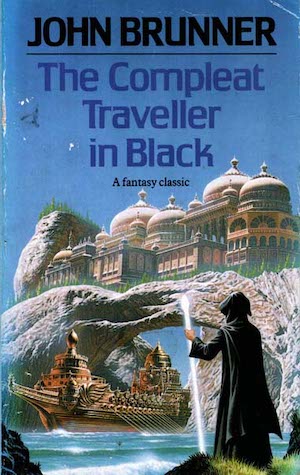
The Traveller in Black “had many names, but one nature, and this unique nature made him subject to certain laws not binding upon ordinary persons. In a compensatory fashion, he was also free from certain other laws more commonly in force.” The immediate consequence is the ability to warp reality according to the whims of passers-by. Five novelettes reveal the wonders that follow the Traveller’s “As you wish, so be it.” The morals of the stories: one should be very, very careful about what one wishes for.
Times Without Number (1974)
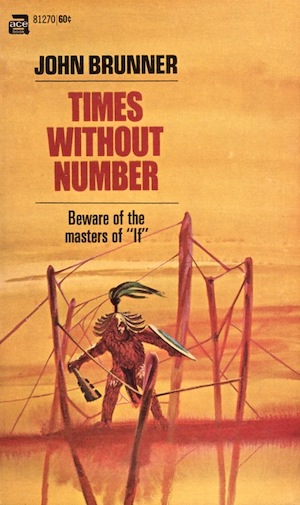
Following the triumph of the Spanish Armada, Western civilization flourished. However, with technological advancement comes hazard. Time travel is so dangerous that rival powers have signed the Treaty of Prague, which regulates the practice.
Don Miguel Navarro, Licentiate in Ordinary of the Society of Time, is one of the functionaries charged with enforcing the treaty. However, not only can profit inspire men to circumvent the Treaty of Prague, so too can national ambition. Over and over again, Don Miguel is faced with preventing temporal crimes. If he fails even once, history as he knows it may be erased.
The Crucible of Time (1983)
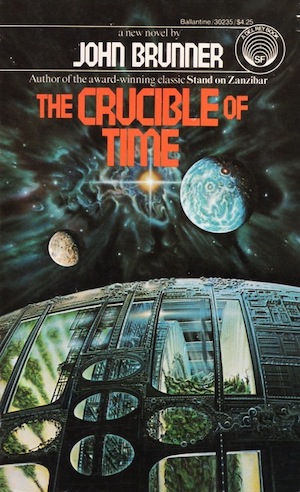
The promising alien civilization that features in this highly episodic fix-up novel has the misfortune to live in a solar system traversing a region of interstellar space far denser than the region in which our Solar System currently resides. Consequently, global catastrophes are frequent. Over and over, the aliens claw their way back to civilization only to be smashed flat once more. With time and effort, they might be able to escape the deathworld they call home…but time is not an asset they have in abundance.
The Club of Rome Quartet
The books in Brunner’s Club of Rome Quartet are standalone novels unified by two premises. The first is that Brunner took for inspiration a different pressing concern of the day, building each book around the dystopian effects that could ensue should these social problems continue to worsen. The second is that the books were stylistically ambitious, a creative choice that brought Brunner critical accolades but, alas, no additional income. Nevertheless, they are arguably his best works. The quartet comprises the following four classics: Stand on Zanzibar, The Jagged Orbit, The Sheep Look Up, and The Shockwave Rider.
Stand on Zanzibar (1968)
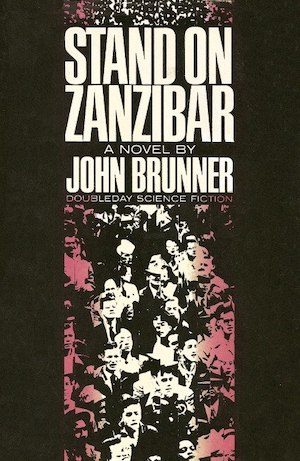
By 2010, seven billion humans call Earth home. Such unthinkable overpopulation has widespread consequences, from ubiquitous eugenic laws, to spiraling violence, all explored in Brunner’s lengthy, dense mosaic novel. A seemingly minor African nation may offer the world an unforeseen method by which overcrowding could become tolerable and sustainable; however, this gift has disturbing consequences.
The Jagged Orbit (1969)
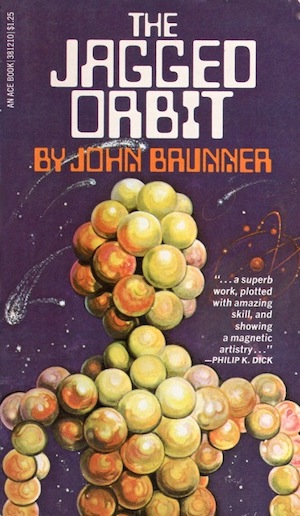
Faced with the need to provide shareholders with ever increasing profits, the weapons companies of tomorrow, in particular the Gottschalk cartel, have done the only responsible thing they could do, which is to exacerbate political and racial tensions in the US. Seeing their neighbours only as potential enemies, Americans have armed themselves with a panoply of advanced weaponry. Still, some members of the cartel are certain that greater profits are to be had; their bold initiatives will bear a very unexpected harvest.
The Sheep Look Up (1972)
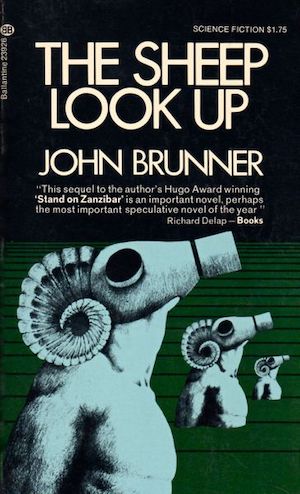
Prosperity demands sacrifice. As Americans become ever wealthier (at least on average), their environment becomes ever more polluted, continental ecosystems ever more fragile. This state of affairs offers yet more commercial opportunity: corporations can sell products that offer ways to survive increasingly toxic air and water (or so they claim). Environmental alarmists are dismissed as prosperity-hating nutcases.
The alarmists are correct. What had been slow decline is transformed into an accelerating collapse, just in time for America’s final Christmas.
The Shockwave Rider (1975)
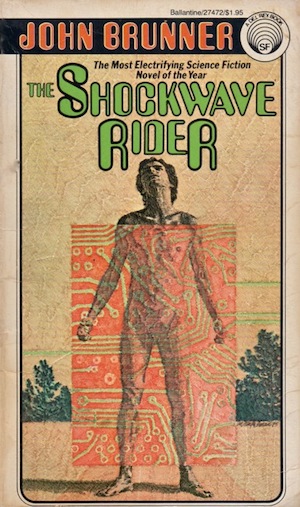
By the early 21st century, accelerating change and information overload are not merely a fact of life, but an increasingly disorienting, increasingly terrifying curse. Most people rely on drugs and therapy to cope, but these methods are curiously ineffective. It is almost as though keeping the populace dazed and confused is a deliberate decision. Nick Haflinger has a unique set of skills by which he can adapt to the world around him… but even his protean talents have their limits.
***
Brunner wrote many books. No, even more books than that! Thus it is absolutely certain that the ten books I selected are not the favourite Brunner books of many Brunner fans. Feel free to mention the books you prefer in the comments, which are, as ever, below.
In the words of fanfiction author Musty181, prolific book reviewer and perennial Darwin Award nominee James Davis Nicoll “looks like a default mii with glasses.” His work has appeared in Publishers Weekly and Romantic Times as well as on his own websites, James Nicoll Reviews (where he is assisted by editor Karen Lofstrom and web person Adrienne L. Travis) and the 2021 and 2022 Aurora Award finalist Young People Read Old SFF (where he is assisted by web person Adrienne L. Travis). He is a four-time finalist for the Best Fan Writer Hugo Award, and is surprisingly flammable.










